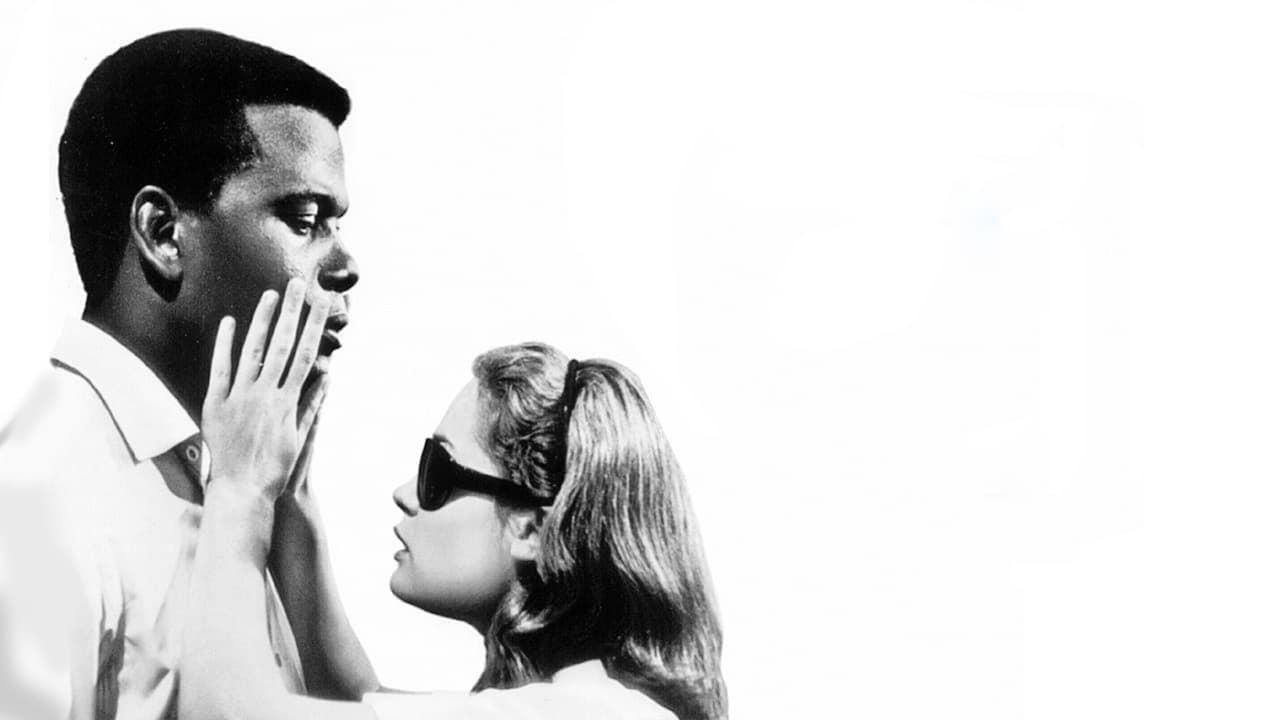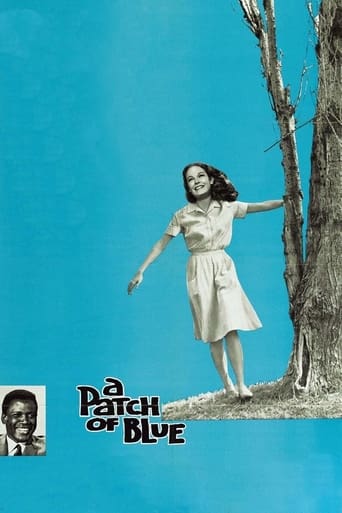

Perfect cast and a good story
... View MoreHighly Overrated But Still Good
... View MoreAm i the only one who thinks........Average?
... View MoreThe movie really just wants to entertain people.
... View MoreThe story of A PATCH OF BLUE has its immediate signifier of a tale of woe, a 17-year-old white blind-girl Selina D'Arcey (Hartman), living with her heinous mother Rose-Ann (Winters) and drunkard grandpa Old Pa (Ford) in a tiny apartment, doing all the chores and extra beadwork under the tyranny of Rose-Ann, there is no light in her life, she has received no education, never ever heard of Braille, even her meagre request of going out to the park nearby to finish her beadwork has been bluntly spurned by her mother.Thankfully, Old Pa is not pure evil like Rose-Ann, he brings her out to the park, leaves her there under a tree, and would pick her up later that day on his way back, usually completely plastered. At least in the park, Selina can finally breathe some fresh air, bask under the sun and daydream that only if she could still see the world, yes, she is not born-blind, it is all because an accident at the age of 5, guess who is the perpetrator? yes, Rose-Ann, her own mother.Right in the park, she meets a kind stranger, Gordon Ralfe (Poitier), whose affable presence and obliging gestures light up Selina's spirit from her wretched domestic tangle, he helps her organise the beads to accelerate her work, offers her pineapple juice which she has never drunk before, and thoughtfully informs her where is the nearest lady room, a cordial friendship kick-starts, but little does she know, Gordon is a black man.During their regular park meetings, Gordon takes her to walk around the neighbourhood, to establish her sense of orientation, teaches her how to cross the zebra crossing, they shop together in the supermarket and cook lunch in his apartment. Gradually, Selina opens up to him about her back-story, her lack of sophistication can even make the most horrendous thing sound like a cakewalk. It shocks Gordon, and stings him to take her under his wings against all the difficulties, an ultimate plan is to save her from the grasp of Rose-Ann, before it's too late. Meanwhile their mutual affinity is burgeoning into something more tangibly affectionate, devoid of any natural reserve, Selina declares her love for him with utter candour, even, in the touching moment, she tells him she doesn't care about his skin colour. What will he do? Thankfully, Gordon is sensible enough to make the right decision which is deemed best for her benefit.Cinematographer-turned-director Guy Green has an extraordinary knack of not sensationalising these obvious pivotal points, instead, he segues the reactions smoothly on to the proceedings in a most naturalistic fashion, take the moment when Selina realises Gordon is black from Rose-Ann's inadvertent blurting, barely a second is given to show Selina's electrified realisation during the on- going squabble which evolves into a symphony of cursing and smashing between Rose-Ann, Old Pa and their neighbours. The scenario is highly dramatised, but in light of Green's discernment, the narrative never falters into something mawkish or overripe.The late Elizabeth Hartman (who woefully committed suicide in 1987 at the age of 43) was the youngest actress Oscar-nominated for BEST ACTRESS IN A LEADING ROLE at that time (a record would be superseded a decade later by Isabelle Adjani in François Truffaut's THE STORY of ADELE H 1975), in her poignant debut, her rendition of a blind girl is simply sympathy-arousing, and she shows no cold-feet against a spontaneously charismatic Poitier, whose righteous sense of justice is seething with Gordon's favourite word - tolerance, they converge upon as a scintillating duo on screen, by virtue of Green's dispassionate script, their scenes together radiate warmth, tenderise and vigour. And, being not heavy-handed with the racial card, the film can find more strength in its reverberations with today's audience.Shirley Winters wins her second Oscar in her turn as Rose-Ann, she is an out-and-out white-trash monster, it is a showy role, and understandably, she would not disappoint, every time the shot cuts to the dreary apartment where Rose-Ann materialises herself along with her hapless daughter, a gnawing worry emerges from our hearts, one might wonder why in the first place, Rose-Ann is outlined as such an atrocious mother, unrepentant, self-loathing and there is not an inkling of humanity in her, is there a blatant misogyny lurking here? Otherwise, considering that there is already a gaping barrier erecting between Selina and Gordon, to ameliorate Rose-Ann's wickedness might have rendered a more truthful spin to the fictional story, that is something would be more sensible since apart from that, the movie is insistently " calm, cool and collected". Last but not the least, to name-check the prolific veteran Wallace Ford, who concludes his swan song with impactful chagrin and self-destructive acquiescence as a "flop". An epitome Hollywood "message" production garlanded with sincere niceties and unassuming Black-and-white presentation, a humdinger it is!
... View MoreA young blind girl (Elizabeth Hartman) finds out the truth about who is really blind in this social drama where color schemes mean nothing to her, even though she was raised by an extremely racist mother. She doesn't know green, only blue as the color of the sky, one of her few memories of when she had vision. Her world with hateful mama Shelley Winters is made a little nicer when a kind black man (Sidney Poitier) befriends her in the park. Portier's worldly young man is the perfect example of a heart as big as all outdoors.Sometimes certain movies touch you so deeply that memories of them resonate as a childhood into adulthood. This is one of them for me, one of the few adult movies my parents had me watch as a child to teach me the absurdities of racism and what it was really all about. I also remembered, more sweetly, the oddly shaped cannister of pineapple juice Poitier gave to Hartman, as well as the beads she strung together to make a living, and the joy he brought to her by just spending most of his free time with her. I also distinctly remembered the evil character Winters portrayed, a far cry from some of the obnoxious but basically decent characters she had already created. One of the best actresses of the 50's and 60's who bravely unleashed the soul of a woman who should never have been a mother, Winters would remain the epitome of the mother from hell, only equaled recently by Monique in "Precious". She is basically "Mommie Dearest" on acid.Veteran actor Wallace Ford is excellent in the pathetic role of Winters' drunken father, a man who obviously hates his daughter so much yet has little compassion for the granddaughter who adores him. If Winters wasn't blowzy enough, there's Elisabeth Fraser as her equally nasty friend. Those two women together are a double dose of hatred, a 60's version of Hitler and Mussolini. With 30's veteran stars Ann Sothern and Joan Blondell playing nicer versions of these types of characters, it is very interesting to see the antithesis of them here.Hartman's explosion out of frustration is a chilling scene, as is the fight scene when Winters sees Poitier and Hartman together. She gets into a fight with Hartman that leads into a throwing match with Ford that has a humorous and ironic conclusion. The public reaction to Winters' confrontation with Poitier in the park is priceless. While I would have preferred that the relationship between Poitier and Hartman be one of understanding devoted friends, I came to accept Hartman's growing love for Poitier (and vice versa) as one they couldn't control.
... View MoreThis film is sad and effective,touching and indelible. Elizabeth Hartman is very sympathetic in this role as a blind teenager, growing up in a borderline white-trash home, with an alcoholic grandfather,and promiscuous down-at-heel mother,capably portrayed by Shelley Winters.Sidney Poitier delivers another effective performance here,as a sympathetic friend to Selena (Hartman) who tries to help better her life,even as his brother,a med student tells him to forget it, Selena is a hopeless case from "a human trash heap".The performances are touching and understated as one feels what it may be like to live as a disabled blind woman. Hartman is trampled and pushed to the ground simply because street people have no time to help her. The world is a cold place, but Poitier offers his friendship and compassion as a small patch of blue in Selena's otherwise dark world. Highly recommended.9/10.
... View MoreShelley Winters deserved an Academy Award as the hideous mother of Selina, the blind girl played beautifully by Elizabeth Hartman. Of course, Sidney Poitier plays the African American man in a time of civil rights and racism where he befriends the lonely blind girl, Selina, in the park. Of course, it can never be more than a friendship but you wish it was more than that because the two of them are like lonely creatures. Poitier's character is a scholar, educated, and well-liked in his position in the college. He assists Selina who lives with her mother in an unhappy living conditions. Her mother has chosen to give up working her blue collar job in a hotel for a job pleasing the men for more money with a friend. Of course, Selina doesn't want to move with her mother's friend. The relationship between Selina and her mother is extraordinarily played by two brilliant actresses, Winters and Hartman. I feel bad that Hartman never got the fame that she deserved.
... View More